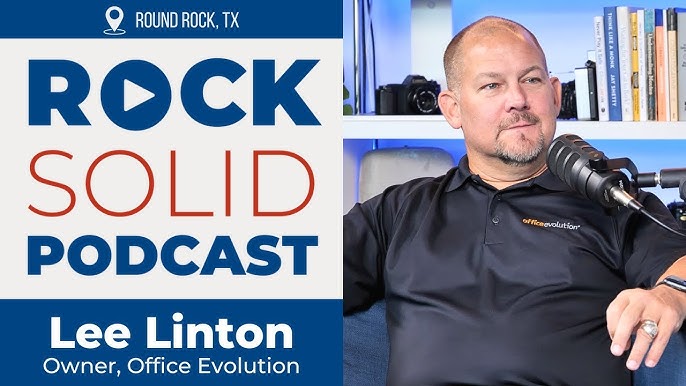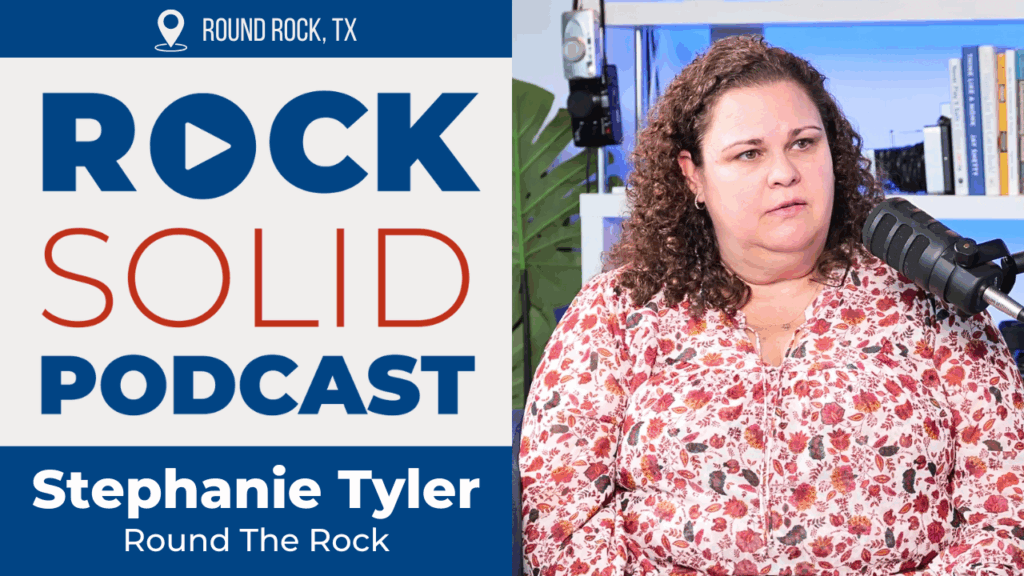Ever stop and wonder who steps in before a hard day turns into a crisis?
Bryan Eisenberg just asked that on the Rock Solid set, and Clarena Tobon from NAMI Central Texas smiled. She knows the answer.
She leads the largest grassroots group in mental health. Three clear actions drive it. Support. Education. Advocacy. Simple, yes. Life-saving, absolutely. She told Bryan that one in five of us will face a mental health condition. The rest stand close by as friends, co-workers, parents, or kids. That means all of us matter in this story.
Bryan lit up when Clarena talked about meeting people before storms hit. Picture free eight-week classes for families. Picture officers, teachers, and parents learning together so kids feel safe. Picture quick talks at work that show team members what signs to spot and who to call. Clarena’s own life proves the point. At eighteen she juggled school, work, and caring for her mom during repeated hospital stays. A support group finally opened the door she needed. She walked in feeling alone and walked out feeling seen. Now she offers that same room to everyone in Central Texas.
Here’s what you can do today. Notice changes. A teen who once joked around but now stays silent. A coworker who skips lunch and locks the office door. Ask, “How are you doing for real?” Share the NAMI helpline. Invite them to a support night. Keep talking even when the first try feels awkward. This is health care just like checking blood sugar or resting a sprained ankle. Catch the signs early and help rides in on time.
Clarena believes Round Rock can lead the way. She loves the mix of cultures, the open roads for family drives, the new food spots her kids chase every weekend. She loves that the Capitol sits a quick hop south, ready for voices on May 1. She pictures a city where every kid, parent, teacher, and officer knows “I’m not alone” the moment worry whispers. Let’s move there together.
Find free programs, dates, and volunteer spots at nami.org. Reach Clarena on LinkedIn when you want to join the cause. Rock Solid will keep shining the light.
Transcript:
Bryan Eisenberg: Welcome to Rock Solid, the Round Rock Business Leaders Podcast. I’m your host, Bryan Eisenberg, and today I’m joined by Clarena Tobon from NAMI.
Clarena Tobon: Thanks, Bryan. I’m Clarena Tobon, executive director of NAMI Central Texas. NAMI stands for the National Alliance on Mental Illness. We serve our community through three pillars—support groups, education, and advocacy.
Bryan: Let’s unpack that. How do those pillars look day-to-day?
Clarena:
- Support – Free groups for family members and for people with lived experience.
- Education – Training for police officers, teachers, parents, and workplaces so everyone knows the early signs and next steps.
- Advocacy – On May 1 we’ll meet legislators at the Capitol with NAMI Texas to push needed policy forward.
Bryan: I tapped into NAMI resources years ago when I was a social worker in New York. Mental illness still carries stigma. Many folks don’t know when to start talking or even how to spot the first signs.
Clarena: Mental health equals physical health. Anxiety hits my chest; stress tightens my hands. We want to reach people before crisis. Bite-size info, early education—so a neighbor, coworker, or parent knows what to do long before an emergency.
Bryan: A chiropractor friend calls it the straw that breaks the camel’s back. One more stressor and everything tips. I’ve felt it myself with blood-sugar swings and brain fog.
Clarena: Exactly. You’re only one life event away from crisis. One in five adults lives with a mental-health condition, but the other four feel the ripple. Our free eight-week family course teaches warning signs and self-care so loved ones can help without burning out.
Bryan: My wife and I run a home-care agency. Families come to us in crisis every day. They’re unprepared. How do we get them to act sooner?
Clarena: Start normalizing the talk. In many cultures—including ours as Latinos—mental-health talk rarely happens at home. Share openly: “I’m anxious today.” That invites someone else to speak. My story shows why it matters.
When I was 18 my mother, my best friend, faced bipolar disorder. I became her translator and caregiver. She cycled in and out of hospitals. Two years later she died by suicide. I felt I’d failed. A peer-support group saved me; strangers felt like family. Now I’m determined to offer that room to others. Our staff pour their hearts into this work—heart plus sustainable funding keeps the doors open.
Bryan: Clinicians see rising anxiety in kids. Social media fuels it. How do you arm parents and teachers?
Clarena: We run Parents and Teachers as Allies. Kids spend more waking hours with teachers than parents on weekdays, so everyone must read the same signals. We train adults to validate feelings, notice shifts—sleep, appetite, isolation—and start calm conversations. My own teens and I use bilingual conversation cards at dinner to keep the door open.
Bryan: Why do people miss those early mental-health “flu-like” symptoms?
Clarena: A broken leg shows. Depression hides. Society still treats mental health as invisible. Meeting communities where they live, talking early and often, changes that.
Bryan: You’ve lived in Chicago and Alaska. What draws you to Central Texas?
Clarena: Affordability, culture, great schools that helped my son with ADHD and anxiety right after COVID. We’ve been in the same area eleven years—stability I never had as a kid.
Bryan: Family fun?
Clarena: Food adventures—Korean, sushi, Indian. For Colombian bites we love Plaza Colombia downtown (they have parking!). We also take long drives, blasting a shared Spotify playlist, stopping wherever looks interesting.
Bryan: How can listeners connect?
Clarena: All free programs are at namicentral.org. To reach me, find Clarena T on LinkedIn.
Bryan: Clarena, thanks for sharing your journey and the work NAMI Central Texas does for all of us.
Clarena: Thank you, Bryan.


